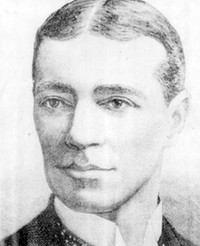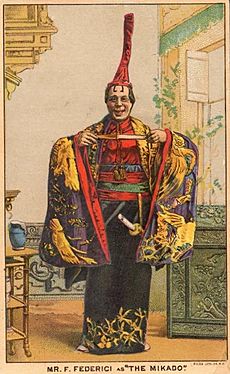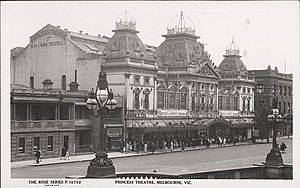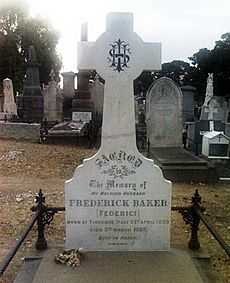Frederick Federici facts for kids
Frederick Federici (born April 22, 1850, died March 3, 1888) was a famous opera singer. He was born in Italy but became a British citizen. He was known for his deep voice, called a bass-baritone, in the popular Savoy Operas. These operas were created by the famous duo Gilbert and Sullivan. Federici is also remembered for a spooky reason: he's said to be a ghost at a theatre in Australia!
Before becoming a singer, Federici worked as a talent agent. From 1879 to 1887, he toured a lot with the D'Oyly Carte Opera Company. He performed in many of Gilbert and Sullivan's funny operas. Some of his famous roles included the Pirate King in The Pirates of Penzance. He even played this role in its very first show in 1879.
He also played Captain Corcoran in H.M.S. Pinafore and Colonel Calverley in Patience. Other roles were Strephon in Iolanthe and Florian in Princess Ida. In 1885, he starred as the Mikado in The Mikado. He also played Sir Roderic in Ruddigore in 1887. These were the first official American shows for those operas.
In 1887, Federici moved to Australia. There, he performed in more Gilbert and Sullivan operas with the J. C. Williamson company. His very last role was Mephistopheles in Gounod's opera Faust. This show was at the Princess Theatre in Melbourne in March 1888. On the opening night, after singing his last note, he went down through a trap door on the stage. Sadly, he had a heart attack and died suddenly. Because of this, a legend says his ghost still haunts that theatre today.
Early Life and First Roles
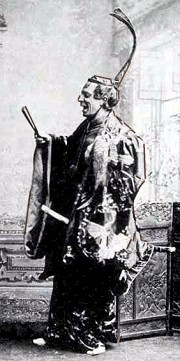
Frederick Federici was born Anatole Frederick Demidoff Baker in Florence, Italy. His father, Eric Thomas Baker, came from a military family. Federici later moved back to Britain. He first trained to work in diplomacy, but he chose to become a singer instead. For a while, he also worked as an agent for actors and even wrote songs.
Federici started singing in London concerts when he was 21, in 1872. He performed at places like the Schubert Society and St George's Hall. Later in 1872, he sang in Glasgow with a group organized by Sims Reeves. He soon appeared in popular "Monday Pops" concerts. He also sang in The Messiah at the Leeds Triennial Festival. He performed in many other big musical shows called oratorios. He also sang at London's Theatre Royal, Drury Lane.
In Ireland, he began taking on opera roles. He played the King in Maritana and Valentine in Faust. He continued to sing in concerts and received good reviews. In 1873, he made his London debut at the Crystal Palace theatre. He performed in Faust, Maritana, and The Bohemian Girl. He also toured with famous singers like Carlotta Patti.
In 1877, Federici performed in Gilbert and Sullivan's Trial by Jury at the Royal Aquarium. Around 1878, he joined the army for a short time.
After leaving the army, he joined the D'Oyly Carte Opera Company in July 1879. He was given the role of Captain Corcoran for a tour of H.M.S. Pinafore. In March 1880, he changed roles to play Bill Bobstay in the same show. During this tour, he married Lena Monmouth, who was also a D'Oyly Carte performer. They later had two children.
To protect the British copyright for the new Gilbert and Sullivan opera The Pirates of Penzance, a special show was held. This happened the day before the opera opened in New York. Federici and his cast, who were performing Pinafore in the evenings, received the music just two days before. They had only one rehearsal. They traveled to Paignton for the afternoon show. They read their parts from scripts and used whatever costumes they had. This is how Federici first played the Pirate King.
Career Highlights in America and Australia
In later D'Oyly Carte tours, Federici played Captain Corcoran in H.M.S. Pinafore. He then played Samuel in The Pirates of Penzance. In 1881, he returned to the role of the Pirate King in Pirates. A newspaper called The Era said he was "capital as the Pirate King." From 1882 to 1883, he played Colonel Calverley in Patience. Reviewers praised his powerful voice and his solo songs.
Through most of 1883, Federici toured as Strephon in Iolanthe. Many newspapers, like The Leeds Mercury, said he was excellent. The Bristol Mercury and Daily Post noted that he sang well and added a quiet humor to the part. In 1884, he played Florian in Princess Ida. The Era newspaper called his performance "most artistic." In 1885, he toured as the Counsel in Trial by Jury and Sir Marmaduke in The Sorcerer. He also continued to play Florian in Princess Ida.
In July 1885, he toured Britain as the main character in The Mikado. After this, he was sent to New York to play the same role. This was for the first official American production of that opera. After touring America with The Mikado, Federici returned to Britain briefly in May 1886. He toured as Dick Deadeye in H.M.S. Pinafore and as the Mikado. Then, he took The Mikado on a D'Oyly Carte tour to Austria and Germany until January 1887.
In February 1887, he made his only appearance at the Savoy Theatre in London. He played the ghost Sir Roderic Murgatroyd in two afternoon shows of Ruddigore. After this, he was sent back to New York. He played Sir Roderic there until April 1887 in the first American production of Ruddigore. After this show, he left the D'Oyly Carte Opera Company.
Federici, along with his wife and children, then traveled to Australia. He joined J. C. Williamson's company. In July 1887, he played Florian at the Princess Theatre in Melbourne. This was the first time Princess Ida was performed in Australia. In August 1887, he appeared at the same theatre as Harry Sherwood in Alfred Cellier's Dorothy. In December 1887, he performed with Leonora Braham in Erminie, playing the Marquis de Pontvert. Other roles he played in Australia included the Mikado, the Pirate King, Dick Deadeye, Colonel Calverley, and Strephon. His wife also played smaller roles in these shows.
Death and the Ghost Legend
On March 3, 1888, Federici was performing as Mephistopheles in Faust. It was opening night at the Princess Theatre in Melbourne, Australia. The famous singer Nellie Stewart was also in the show. The opera ended with Mephistopheles dramatically sinking through a trapdoor, going back to hell. As Federici was being lowered into the basement, he had a heart attack and died within minutes. He was only 37 years old.
The Press newspaper in Melbourne wrote about his career and the sad event: "The tragic and terrible event... must bring sympathy and sadness to everyone. Mr Federici had great success in England and America in funny operas. But he was also a wonderful musician and wrote several good songs. Before joining comic opera, he sang successfully at some of the best concerts in London. It feels wrong to talk about the performance of an actor who has just been buried. However, it is only fair to say that he sang and acted in a truly artistic way on Saturday night. He had never performed better. The theatre was closed on Monday evening to honor the artist who passed away."
The Argus newspaper in Melbourne also shared a detailed story of what happened. It said that after he collapsed, Federici was taken to the theatre's green room. His doctor was there but could not save him.
The actors on stage, like the audience, did not know he had died. But when they were told what happened at the end of the opera, they reportedly said he had just been on stage with them, taking bows. Since then, people who work at the theatre have claimed to see a ghostly figure in evening clothes. For many years, a seat in the third row of the dress circle was left empty for him on every opening night.
Frederick Federici was buried in Melbourne General Cemetery on March 5, 1888. There is a restaurant in Melbourne called Federici Bistro, named after him. His wife and children returned to England in June 1888. His wife later remarried in 1894.
 | Stephanie Wilson |
 | Charles Bolden |
 | Ronald McNair |
 | Frederick D. Gregory |


